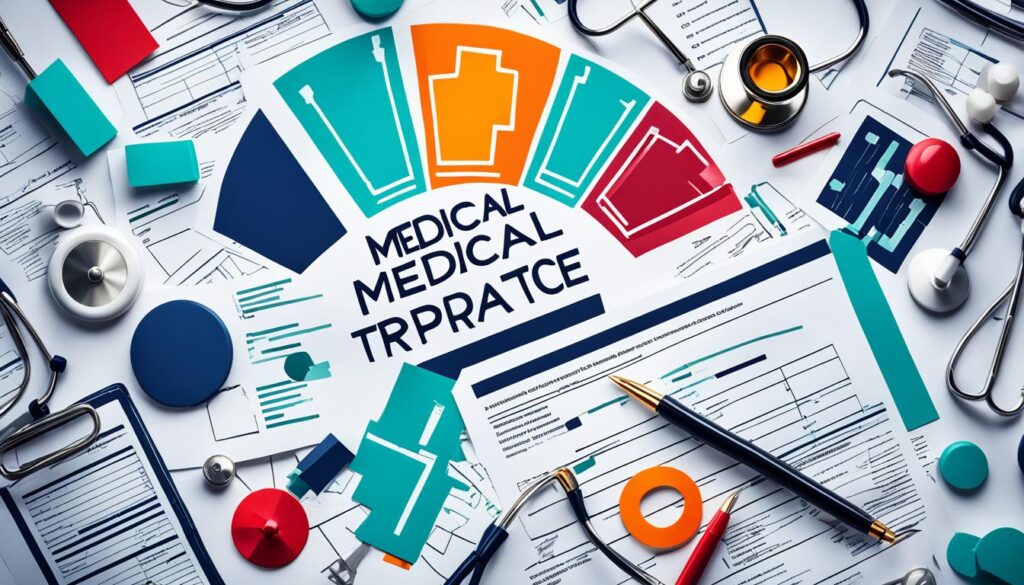Have you ever been hurt due to a mistake in your medical care? Wondering when to get legal help is common. Knowing about legal matters can help you win justice and get what you deserve.
This article will show when to act on a medical lawsuit and what to look out for when finding a lawyer. We’ll talk about legal time limits and how to settle fairly. You’ll learn how to deal with legal issues in medical cases.
So, when is it time to get legal help for a health injury? Let’s dive in.

Key Takeaways:
- Medical malpractice happens when a doctor’s mistake hurts a patient.
- Legal help is key for a successful lawsuit to protect your rights.
- It’s important to know the time limit for making a medical lawsuit.
- Telling doctors and collecting facts are vital steps for a strong case.
- Expert opinions help a lot in showing medical mistakes and their effects.
Understanding the Statute of Limitations for Medical Malpractice Lawsuits
If you’re thinking about suing for medical malpractice, knowing the statute of limitations is key. This rule sets the time for filing a lawsuit. Usually, this period is one to three years after the injury or its discovery. It differs across states.
Getting to know this time limit is vital to act quickly. If you miss this period, your lawsuit might get dismissed. So, it’s important to act within the set time.
The statute protects doctors from endless lawsuit threats. It aims for quick dispute resolution. And it helps avoid cases where evidence might get lost or become uncertain over time.
The Significance of the Statute of Limitations
The statute of limitations is very important in such lawsuits for a few reasons:
- Preservation of evidence: Acting fast is crucial in collecting evidence and proving malpractice. This law makes sure plaintiffs move quickly to get all needed documents and witness accounts.
- Patient rights: This time limit defends the rights of everyone involved. It shields possible defendants from endless legal risk. Yet, it gives plaintiffs a fair chance to file their claims.
- Judicial efficiency: Quick case resolutions help the court system stay effective. Following these time limits prevents case pile-ups.
Talking to a malpractice lawyer quickly is a smart move. They can tell you the exact time limits for your case. A skilled lawyer will support you through the process and safeguard your rights.
“Understanding and following the statute of limitations is crucial in medical malpractice cases. It pushes plaintiffs to act fast in seeking fairness while respecting healthcare providers’ rights.”
Notifying Healthcare Providers and Gathering Evidence for a Medical Malpractice Lawsuit
Before starting a medical malpractice lawsuit, you must tell the healthcare provider you plan to sue. This notice is a formal way to say you think their mistakes hurt you. You need to clearly share why you’re suing, what injuries you have, and your losses.
Notifying healthcare providers must be done carefully and professionally. Here are some steps to consider:
- Get your medical records: Ask for a full copy of your medical records from the provider. These records are key to showing the mistakes and harm in your case.
- See an expert: Find a medical expert who can look at your records and say if there was malpractice. Their expert view is crucial to prove your case.
- Keep track of your harm and losses: Write down all your injuries, medical bills, lost income, and other damages from the malpractice.
- Write a formal notice: Create a detailed notice about your claim. Include the negligence you allege, your injuries, and losses.
- Send the notice: Give the notice to the provider as your state’s laws say. It’s best to send it by certified mail to have delivery proof.
Gathering strong evidence is vital for your medical malpractice case. You’ll need:
- Medical records: Gather all medical records showing your treatment, the provider’s actions, and any complications or injuries that followed.
- Expert testimonies: Get opinions from medical experts in your claim’s field. Their insights on negligence and care standards are very important.
- Witness statements: If people saw the treatment or procedure, their statements can support your claims.
- Photos or videos: If possible, collect photos or videos showing the harm caused by the malpractice.
Gathering and arranging the right evidence is crucial to prove medical malpractice. It’s important to work with an experienced malpractice lawyer. They can help you with these steps and build a strong case foundation. With their guidance, you can argue well and increase your chances of winning your lawsuit.
“The practice of gathering evidence and notifying healthcare providers is critical in establishing a strong medical malpractice case. By following the proper procedures and seeking legal representation, you can navigate the complex landscape of medical malpractice lawsuits with confidence.” – [Insert Attorney Name]

Case Study: Gathering Compelling Evidence
To show how important it is to gather evidence, let’s look at a case of surgical error. A patient had a routine surgery but then faced severe complications because the surgeon made mistakes. To build their case, the patient did the following:
- Got all records tied to the surgery, including before and after the operation.
- Hired an expert surgeon who said the operating surgeon’s care was below the standard, leading to the complications.
- Gathered statements from nurses and others who saw the mistakes during the surgery.
- Focused on documenting the injury, pain, and emotional upset caused by the error.
By carefully collecting and organizing strong evidence, the patient was able to make a solid case. This led to a successful settlement.
The Role of Expert Witnesses in Medical Malpractice Lawsuits
In medical malpractice lawsuits, having evidence is key. This is more than what the victim says. Expert witnesses help with this. They offer professional opinions in court to back the victim’s claim. Their knowledge is crucial for proving the case and getting justice.
Their Expertise Counts
Expert witnesses know a lot about the medical field. They have special skills for the case. For these lawsuits, they’re usually medical experts who know what care should be like.
These experts look at medical records and the care given. They see if it matched what’s expected in the medical world. If not, they can point out where things went wrong.

The Importance of Testimony
Expert witnesses do more than review facts. They share their opinions in court. Their words are powerful because they are experts. This helps explain difficult medical terms and prove where care fell short.
“Expert witnesses are key in medical malpractice lawsuits. They offer unbiased opinions thanks to their knowledge. Their words help prove when care was not as it should be, blaming the right people for mistakes.”
Legal Representation for Malpractice
If you’re taking a medical mistake to court, expert witnesses are vital. But, they are usually brought in by a lawyer. Lawyers who handle these cases know how important these experts are. They work together to make the victim’s case stronger.
These lawyers have connections with top expert witnesses. They choose the best for each case. This helps a lot in making the victim’s case better.
Expert witnesses are very important in these lawsuits. They offer their deep understanding, review records, and give important opinions. They help show where mistakes were made. With these experts and good lawyers, victims can seek the justice and compensation they deserve.
Reviewing Contracts and Understanding Arbitration in Medical Malpractice Lawsuits
Dealing with medical malpractice means looking closely at contracts like healthcare services or insurance plans. These often have terms you must follow before suing. Mandatory arbitration is one such term you might find. This is an alternative to going to court.
Arbitration changes how you can sue for malpractice. You must understand what these contracts say and how arbitration works. A skilled attorney in medical malpractice and healthcare contracts is vital.
It’s key to grasp the terms in healthcare contracts and arbitration for malpractice lawsuits.
Arbitration lets you present your case to an arbitrator instead of a court. This has both good and bad points. Think carefully about each option.
Advantages of arbitration include:
- Efficiency: Arbitration is often quicker than court.
- Lower Costs: It can be cheaper than going to court.
- Confidentiality: Arbitration keeps your case private.
But, understand the downsides:
- Limited Discovery: You might not get as much evidence in arbitration.
- Reduced Appeal Options: It’s harder to appeal an arbitration decision.
- Lack of Public Record: Arbitration doesn’t go on the public record.
Arbitration clauses in contracts might stop you from going to court. It’s critical to talk to an experienced lawyer. They can guide you through arbitration.
Reviewing Contracts
Look carefully at medical or insurance contracts. They have clauses for malpractice cases. These include notifying the provider or insurance in a specified time.
Healthcare contracts can be quite different. Some set deadlines for lawsuits. Others require mediation before arbitration or court. Not following these terms can hurt your case.
Navigating the Arbitration Process
If arbitration is in your contract, you must follow its steps. This usually means writing a demand for arbitration and paying fees. An arbitrator gets picked, and the process starts.
During arbitration, you’ll present evidence and witness statements. The arbitrator listens and then makes a binding decision.
Remember, arbitration is enforceable by law. You must accept its outcome.

Types of Medical Malpractice Cases and Common Injuries
Medical malpractice happens in different ways, leading to various injuries. Knowing the types of malpractice and the harm they can cause is key when suing. Some common malpractice examples are:
- Surgical Errors
- Medication Mistakes
- Failure to Provide Proper Treatment
- Diagnostic Errors
- Anesthesia Errors
- Birthing Injuries
Each kind of malpractice can severely harm a patient. Surgical errors may include operating on the wrong site or causing internal damages. Medication mistakes can lead to harmful reactions or overdoses. Not getting the right treatment can worsen your health or cause more pain.
Diagnostic errors might mean a missed or wrong diagnosis. Anesthesia mistakes can lead to serious surgery complications. Birthing injuries can harm both mother and baby, causing long-term issues.
Common Injuries in Medical Malpractice Cases
Injuries from medical malpractice vary with each case. Common injuries are:
- Physical pain and suffering
- Emotional distress
- Disfigurement and scarring
- Permanent disabilities
- Loss of bodily functions
- Permanent health complications
Understanding the Impact
These injuries significantly affect the victims’ lives. They may need more medical care, surgeries, or long-term attention. The pain and emotional stress can also change their life quality and daily function.
If you’re looking into a lawsuit for medical malpractice, talking to a skilled attorney is crucial. A good lawyer will understand your case, collect evidence, and guide you through the legal steps to seek justice.

The Process of Negotiating a Medical Malpractice Settlement
In many cases, medical malpractice disputes are settled outside of court. This involves both sides and their lawyers discussing possible agreement terms. They look at various things during talks. This includes the injuries’ severity, how the patient’s life changed, and the proof available.
Settling out of court is very important in these lawsuits. It allows both sides to avoid a long, costly trial. The injured person can get compensation quickly. Meanwhile, the healthcare provider can dodge bad press and an uncertain trial result.
Lawyers who specialize in medical malpractice represent their clients’ best interests in these talks. They figure out how badly the patient was hurt, considering money lost and pain felt. They tally up bills, lost earnings, and other costs. They also think about the pain, emotional stress, and lower life quality.
Good negotiation tactics are crucial. Lawyers need solid proof and arguments to back up the damage claims. This might include medical history, expert opinions, and more. They use their knowledge and experience to get the best deal possible.
The negotiation’s success hinges on both sides wanting a fair deal. The injured and their lawyer must show how the healthcare provider was at fault. On the other hand, the defense will try to reduce how much they pay out.
Open and positive talks are key. Both sides may suggest different settlement amounts until they agree. Sometimes, they may use mediation or arbitration to help. A neutral person then helps them find a middle ground.
Legal know-how is vital to negotiate a medical malpractice settlement. That’s why a top-notch lawyer is crucial. They guide their client through the process, protect their rights, and get a fair settlement. This helps make up for the patient’s losses.
Settlement talks can save both sides from the hassle and cost of a trial. Still, it’s key to have a great lawyer check any settlement offer. This ensures the patient’s needs are fully met.
Example Settlement Negotiation Process:
| Step | Action |
|---|---|
| 1 | Initial discussion between legal representatives of both parties |
| 2 | Presentation of evidence supporting the patient’s claim for damages |
| 3 | Deliberation and initial settlement offer |
| 4 | Counteroffers and negotiations |
| 5 | Consideration of alternative dispute resolution methods (if applicable) |
| 6 | Agreement on final settlement terms |
| 7 | Documentation and signing of the settlement agreement |
| 8 | Distribution of settlement funds |
Knowing how medical malpractice settlements work helps both injured patients and healthcare providers. Good communication, hardworking lawyers, and a fair approach make settlements a good option for solving these legal issues.

The Importance of Legal Representation in Medical Malpractice Lawsuits
Hiring a lawyer is crucial if you’re facing a medical malpractice lawsuit. An expert malpractice lawyer guides you through the tricky legal process. They help you understand malpractice laws and collect important evidence. This is key in seeking justice and compensation.
A skilled lawyer is great at proving medical mistakes. They show how a healthcare provider did not meet care standards. This caused you harm. Understanding medical practices and getting expert witnesses are steps in this process.
Also, a good lawyer will deal with insurance companies for you. These companies often try to pay less or refuse claims. Your lawyer makes sure you are treated fairly. They help get you compensation for injuries and other losses.
Your lawyer works hard to make a strong case for you. They gather evidence, talk to witnesses, and handle legal paperwork. They’re also ready to represent you in court if needed. Being well-versed in malpractice law and court proceedings boosts your case’s success chance.
The Role of a Malpractice Attorney at a Glance
Here’s a quick look at what a malpractice lawyer does for you:
- Provide guidance and support throughout the legal process.
- Navigate complex medical malpractice laws and regulations.
- Collect and organize crucial evidence to prove medical negligence.
- Engage and consult with expert witnesses to strengthen the case.
- Negotiate with insurance companies to secure fair compensation.
- Present a strong argument in court, if the case goes to trial.
Getting a skilled malpractice lawyer helps level the playing field. They protect your rights and advocate for the justice you deserve. They’re committed to holding healthcare providers accountable for their mistakes.

Understanding Non-Economic Damages in Medical Malpractice Lawsuits
In medical malpractice lawsuits, you can get two types of damages. Economic damages are for money lost, like medical bills and missed work. Non-economic damages are for things like pain, emotional stress, and not being able to enjoy life as before. It’s key to grasp this to ensure you get a fair deal.
Non-economic damages give money for the unseen losses caused by a healthcare worker’s mistake. They recognize the pain and emotional hurt you’ve faced. This aims to give you some justice.
Several factors decide the amount for non-economic damages. These include how bad the injuries are, how they affect your life, the pain’s intensity, and the emotional upset it caused.
Figuring out non-economic damages isn’t simple because they’re about personal experiences. But, judges and juries look at all proof carefully. They check expert opinions, medical records, and what the injured person says to understand how their life changed.
Remember, each state has its own rules on the max amount for non-economic damages in these lawsuits. Caps on damages vary by state. It’s very important to talk to a skilled malpractice lawyer who knows your state’s laws. They can tell you about any limits on what you might get.
In short, non-economic damages are crucial in medical malpractice lawsuits for the unseen and emotional losses. Having a good malpractice lawyer is key. They can fight for your rights and help you get the compensation you deserve for your injuries.
References:
- “Non-Economic Damages in Medical Malpractice Lawsuits.” National Center for Biotechnology Information.
- “Collecting Damages in a Medical Malpractice Lawsuit.” FindLaw.

Seeking Legal Help for Medical Malpractice Lawsuits
If you have been hurt by medical malpractice, getting legal help fast is key. Talking to a good malpractice lawyer can open your eyes to your case. They can walk you through the legal steps, look out for your interests, and aim to get you the compensation you should have.
For medical malpractice claims, having a strong lawyer by your side is crucial. A seasoned attorney knows how to handle healthcare negligence cases. They will defend your rights. Besides giving legal advice, they also offer emotional support when you need it most.
In your first meeting with a malpractice lawyer, be ready to share your story plainly. The lawyer will look at the strong and weak points of your claim. Choosing a lawyer with a good track record in medical malpractice is critical.
If medical malpractice has affected you, don’t wait to get legal advice. The right lawyer can help you face the challenging journey of a lawsuit. You can strive for the justice and compensation you deserve with their guidance.